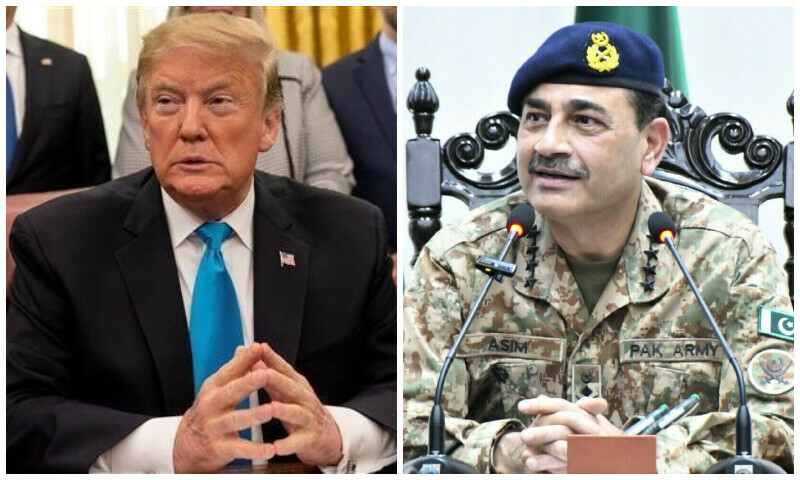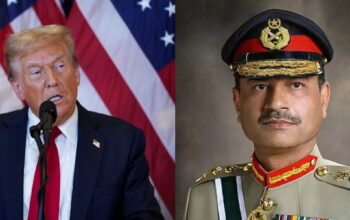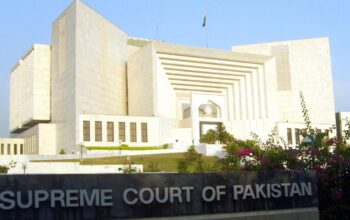By Staff Reporter
ISLAMABAD: President Donald Trump welcomed Field Marshal Syed Asim Munir, the chief of Pakistan’s army, to the White House on Wednesday, a historic encounter that made Munir the first serving Pakistani military leader to meet a sitting US president without holding political office.
Trump called the meeting an “honor” and credited Munir with helping to prevent a nuclear war with India earlier this year, a claim that has sparked sharp pushback from New Delhi.
The lunch, held in the Cabinet Room and closed to the press, came as a significant boost for Pakistan, which has watched warily as the Trump administration cultivated closer ties with its archrival, India, in recent years. Earlier this month, Indian media celebrated a meeting between an Indian delegation and U.S. Vice President JD Vance as a diplomatic triumph, contrasting it with Pakistan’s apparent lack of high-level access in Washington.
Munir’s White House invitation, however, has shifted that narrative, with officials in Islamabad hailing it as a counterpoint and a testament to Pakistan’s enduring strategic relevance.
The two-hour session unfolded just hours after Trump dismissed Indian Prime Minister Narendra Modi’s assertion that the United States played no role in easing tensions between India and Pakistan in May.
Unlike past Pakistani military rulers, such as Field Marshal Ayub Khan, Gen. Ziaul Haq, and Gen. Pervez Musharraf, who met U.S. presidents only after taking on the mantle of head of state, Munir’s visit marked a rare diplomatic milestone.
A brief, informal “walk-in” by then-President Barack Obama during a 2010 meeting with Gen. Ashfaq Parvez Kayani stands as the closest precedent, but it was far from the formal engagement seen this week.
Speaking to reporters later, Trump reflected on the meeting’s significance. “I was honoured to meet him today,” he said of Munir.
When pressed on whether the talks touched on the ongoing Israel-Iran conflict, Trump offered a broader take. “They know Iran very well, better than most, and they’re not happy about anything. It’s not that they’re bad with Israel. They know them both, actually, but they know Iran better.”
Pakistani media had anticipated that Munir would use the meeting to urge Trump not to deepen U.S. involvement in Israel’s war with Iran and to advocate for a ceasefire—a stance informed by Pakistan’s role in representing Iran’s interests in the United States through a section of its Washington embassy, given Tehran’s lack of direct diplomatic ties with the U.S.
But the meeting has also raised concerns in Islamabad that Washington might push Pakistan to align more closely with the U.S. position, which has historically tilted toward Israel. Such pressure could strain Pakistan’s careful balancing act in the Middle East, where it nurtures ties with Iran and Gulf nations while championing the Palestinian cause, all while avoiding entanglement in regional rivalries that could ignite domestic unrest.
Trump did not elaborate on the specifics of their agreement, leaving room for speculation about the depth of their talks.
The timing of the meeting has intensified its geopolitical weight. Tensions between Israel and Iran flared last Friday when Israeli forces launched strikes on Iranian nuclear sites and senior officials, prompting swift retaliation from Tehran against Israeli territory.
The spiraling conflict has stoked fears of a broader Middle East war, with potential ripple effects on global energy markets and regional stability. Pakistan, which shares a porous border with Iran and has long-standing ties with Tehran, has repeatedly urged de-escalation.
The White House lunch also carried echoes of recent tensions closer to home for Pakistan.
The president also tied the meeting to his narrative of averting a catastrophic clash between India and Pakistan. “He agreed with me,” Trump said of Munir. “The reason I had him here was that I wanted to thank him for not going into the war [with India]. And I want to thank PM Modi as well, who just left a few days ago. We’re working on a trade deal with India and Pakistan. These two very smart people decided not to keep going with a war that could have been a nuclear war. Pakistan and India are two big nuclear powers.”
White House spokeswoman Anna Kelly said Trump hosted Munir after the Pakistani army chief publicly called for the president to be nominated for the Nobel Peace Prize for his efforts in staving off a nuclear conflict between India and Pakistan.
But behind the scenes, insiders painted a different picture, suggesting the meeting stemmed from “unorthodox efforts” by a mix of advisers, businessmen, and influential figures rather than the usual diplomatic playbook, Dawn newspaper reported
Diplomatic sources in Washington revealed that the groundwork for the meeting had been laid over months, shrouded in secrecy until Trump’s official schedule went public on Tuesday. They pointed to a web of factors that paved the way: intensified U.S.-Pakistan counter-terrorism collaboration, engagement with cryptocurrency-linked influence networks, and strategic lobbying by Republican-aligned firms.
A working lunch brought senior aides from both delegations to the table, and those in the know hailed the encounter as a potential turning point in U.S.-Pakistan relations.
South Asia analyst Michael Kugelman urged a wider lens on the meeting’s implications. “There’s been U.S.-Pak engagement on critical minerals, crypto, [and] counter-terrorism,” he said. “Trump takes a deep personal interest in all of these. And Munir is empowered to talk about it all. Also, Kashmir.”
The White House meeting followed a Tuesday phone call between Trump and Modi on the sidelines of the G7 summit in Canada, where Modi was a guest. It marked their first direct exchange since the May 7-10 flare-up between India and Pakistan.
Indian Foreign Secretary Vikram Misri, briefing reporters on the call, said Modi told Trump that the ceasefire came through direct military talks between the two nations, not U.S. mediation. “Talks for ceasing military action happened directly between India and Pakistan through existing military channels, and on the insistence of Pakistan,” Misri said. “Prime Minister Modi emphasised that India has not accepted mediation in the past and will never do.”
Misri added that Modi briefed Trump on “Operation Sindoor,” India’s ongoing cross-border strike campaign, and that Trump voiced support for India’s anti-terrorism efforts. A White House official confirmed the call but offered no further details.
Trump, however, doubled down on his version of events Wednesday afternoon on the White House lawn. “Well, I stopped a war,” he told reporters. “I love Pakistan. I think Modi is a fantastic man. I spoke to him last night. We’re going to make a trade deal with Modi of India. But I stopped the war between Pakistan and India.”
Pointing to Munir’s role, he added: “This man was extremely influential in stopping it from the Pakistan side. Modi from the India side and others. They were going at it—and they’re both nuclear countries. I got it stopped.”
The meeting marked a rare high point in U.S.-Pakistan relations, which have cooled under both Trump and his predecessor, Joe Biden, as Washington leaned heavily on India to counter China’s growing influence. Munir’s visit, part of a five-day official trip to the United States arranged weeks in advance, suggested a recalibration of that approach.
Munir, elevated last month to Pakistan’s rare five-star rank—the first since Ayub Khan in 1959—has used his U.S. visit to project strength, urging India to engage with Pakistan “as a civilized nation” rather than pursuing regional dominance.
Copyright © 2021 Independent Pakistan | All rights reserved




